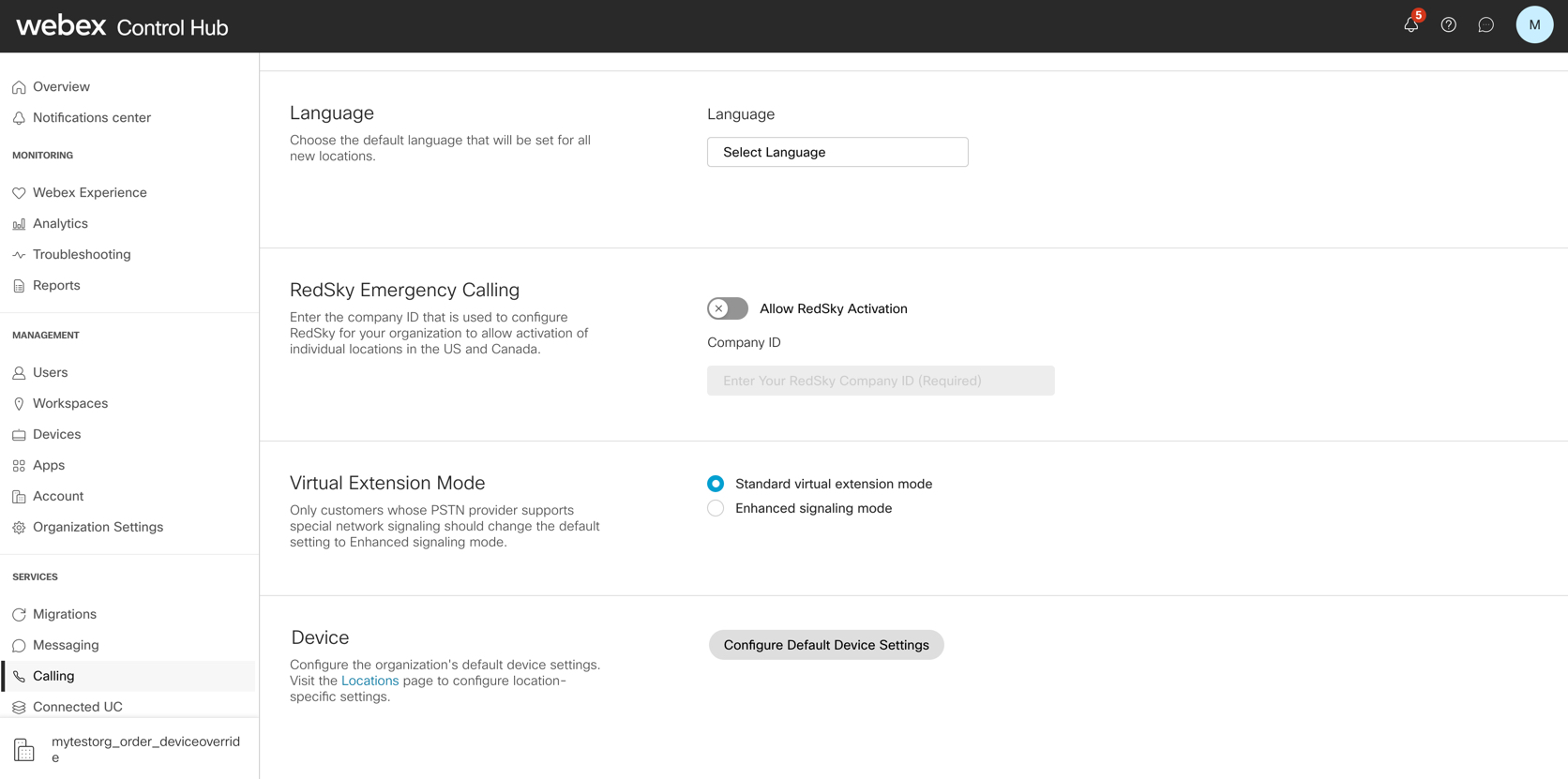Definir e modificar as configurações do dispositivo no Webex Calling
 Comentários?
Comentários?
-
A alteração das configurações no nível da organização se aplica a todos os locais.
-
Para obter instruções sobre como personalizar as configurações do Cisco Video Phone 8875 e do Cisco Desk Phone Série 9800, consulte Configurar configurações do telefone no Control Hub.
| 1 | |
| 2 |
Acesse . |
| 3 |
Na seção dispositivo, clique em Configurar configurações padrão do dispositivo.
|
| 4 |
Selecione o tipo de dispositivo no menu suspenso, como MPP, ATA, DECT ou dispositivos de terceiros. 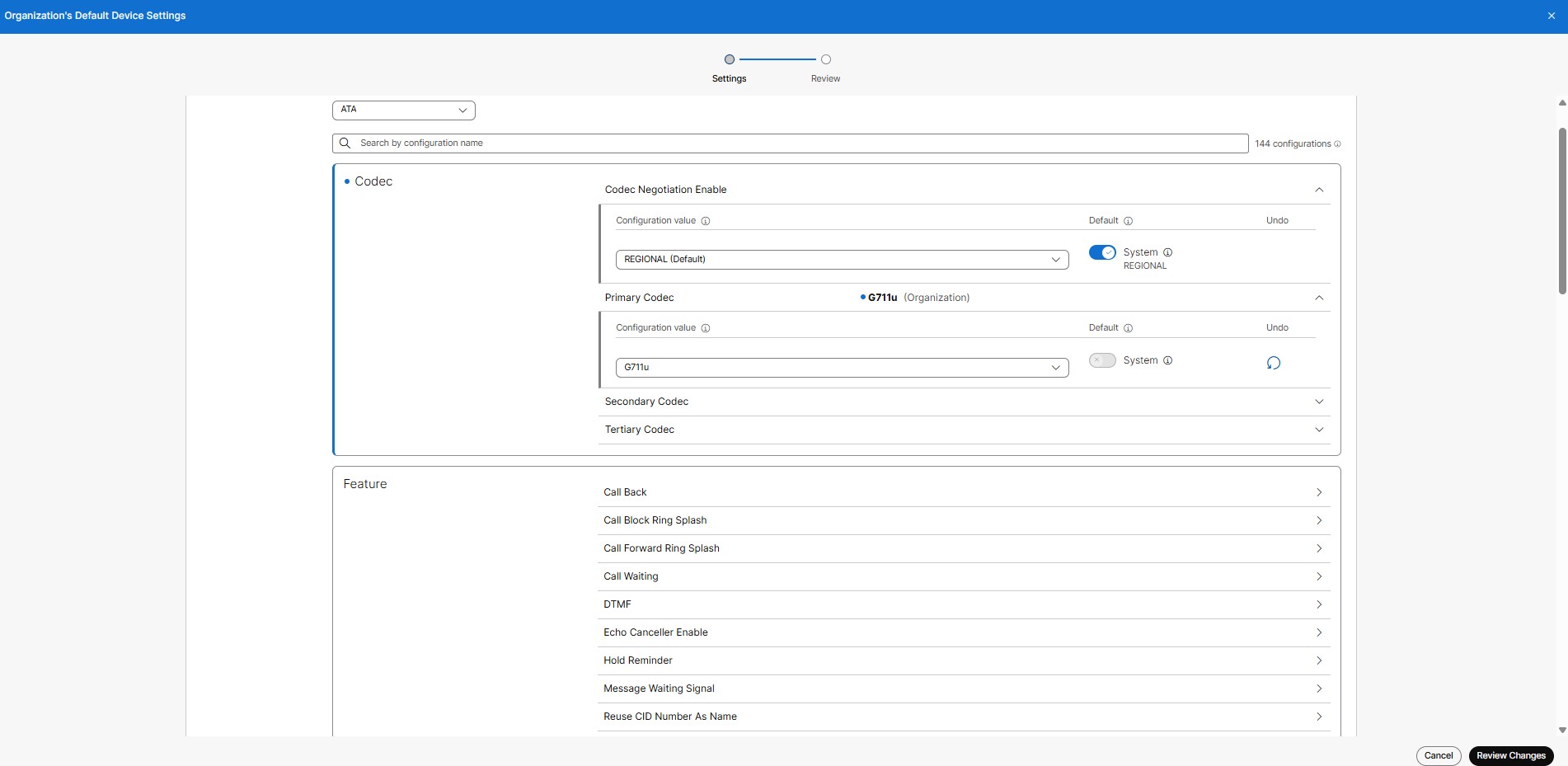 |
| 5 |
Atualize as configurações necessárias do dispositivo e clique em Revisar alterações. Use a dica de ferramenta ao lado da configuração para visualizar sua definição.
|
| 6 |
Clique em Iniciar processamento. Essas alterações não serão aplicadas a nenhum dispositivo no modo de configurações personalizadas (ou seja, que não herdem configurações de localização ou de nível organizacional). Uma vez iniciado, você poderá ver o progresso na página de Tarefas. Não será possível fazer mais nenhuma alteração nas configurações do dispositivo até que essas atualizações sejam concluídas. |
O que fazer em seguida
Após a conclusão do processo, ressincronize os dispositivos do Control Hub ou peça aos usuários para ressincronizarem os dispositivos no menu de configurações do dispositivo para que as alterações entrem em vigor.
Antes de começar
-
A hora e a data são definidas pelo endereço e fuso horário selecionados. Você só pode configurar a hora e a data a partir do dispositivo local.
-
Para obter instruções sobre como personalizar as configurações do Cisco Video Phone 8875 e do Cisco Desk Phone Série 9800, consulte Configurar configurações do telefone no Control Hub.
| 1 | |
| 2 |
Acesse |
| 3 |
Selecione o local que deseja atualizar. |
| 4 |
Selecione a guia Chamadas e clique em Gerenciar ao lado de Gerenciamento de dispositivos . 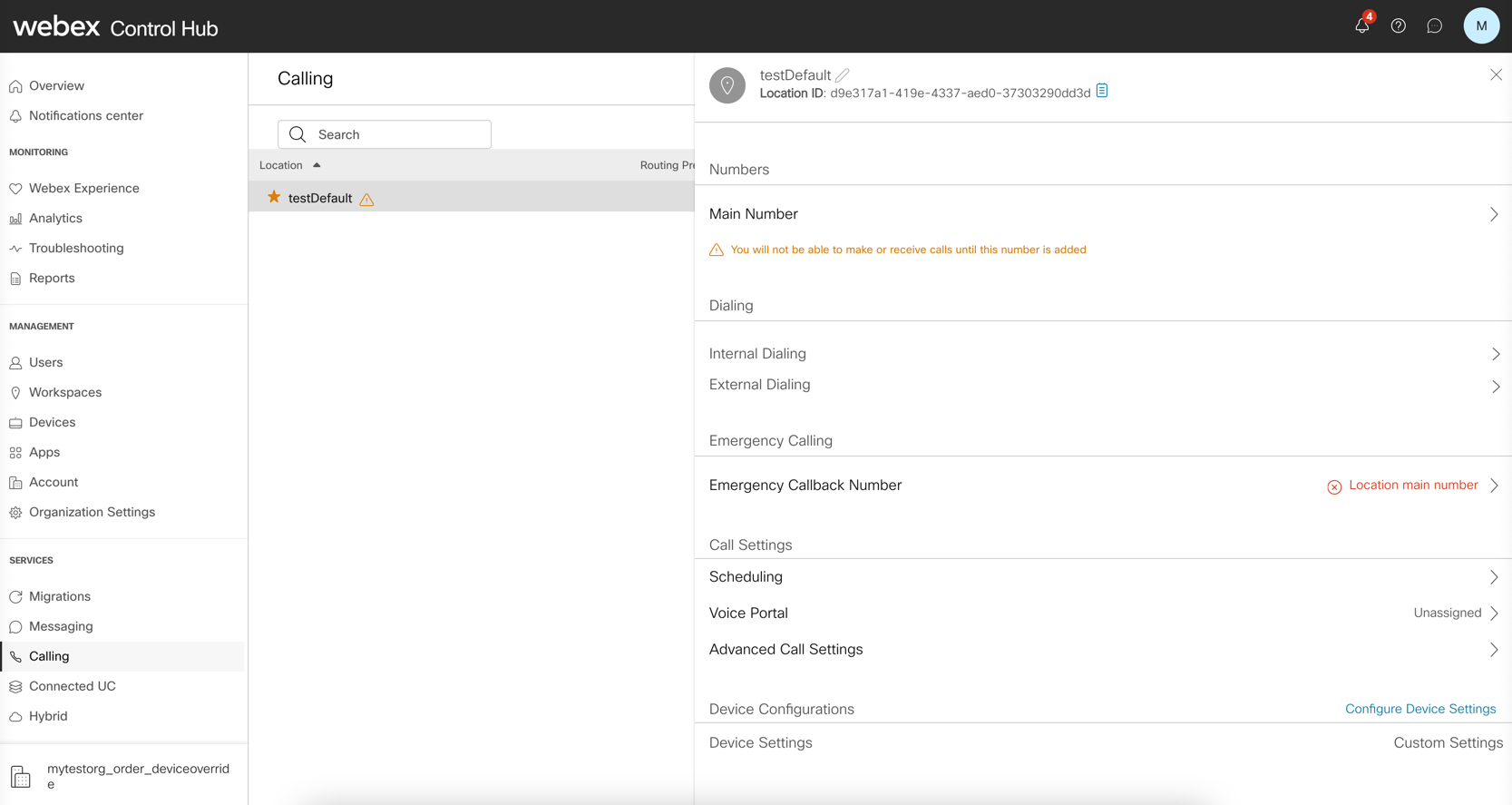 |
| 5 |
Escolha Definir configurações personalizadas do dispositivo para modificar a configuração padrão. 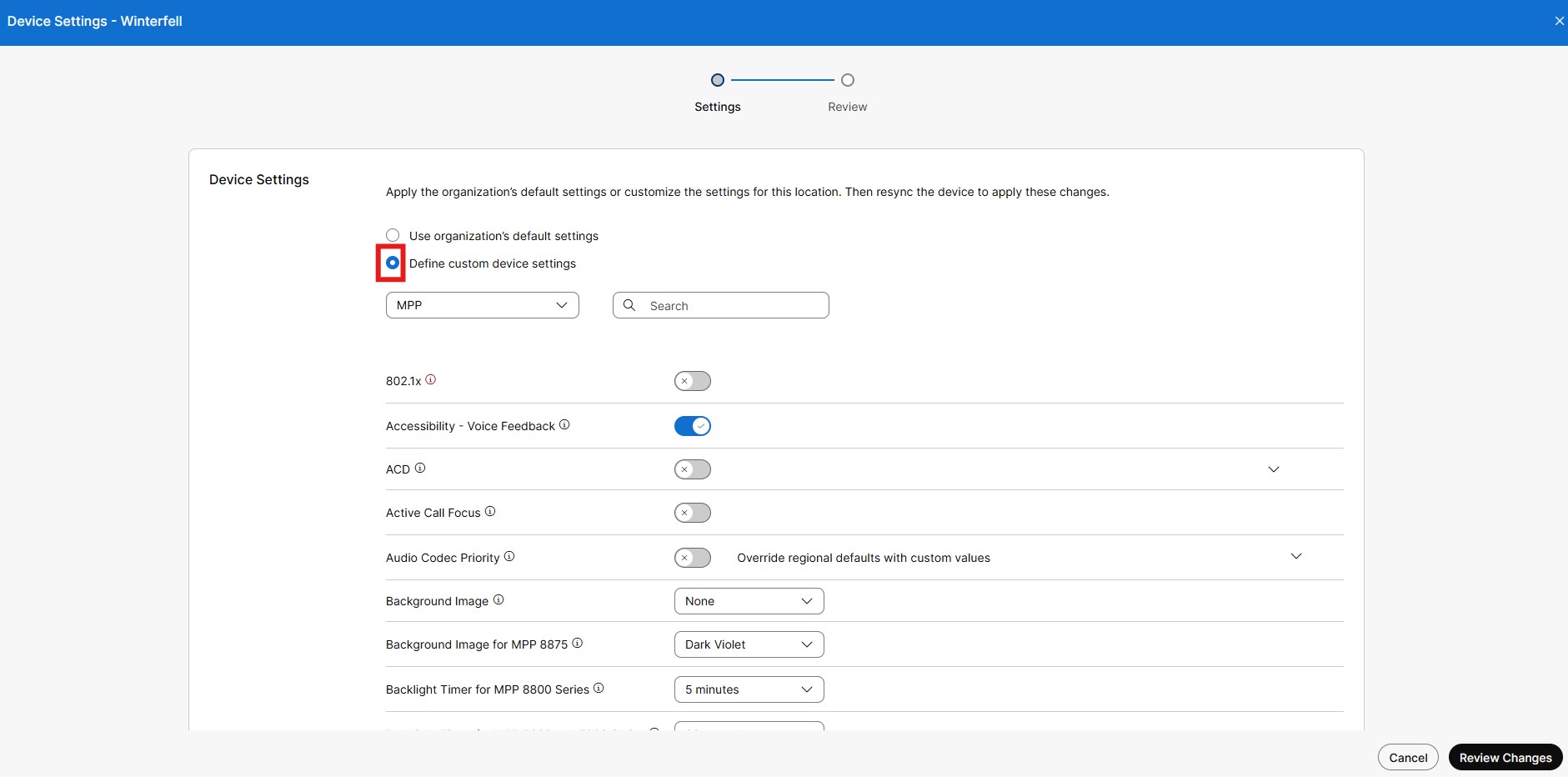 |
| 6 |
Selecione o tipo de dispositivo no menu suspenso, como MPP, ATA, DECT ou dispositivos de terceiros. |
| 7 |
Atualize as configurações necessárias do dispositivo e clique em Revisar alterações. Use a dica de ferramenta ao lado da configuração para visualizar sua definição.
|
| 8 |
Clique em Iniciar processamento. Essas alterações não serão aplicadas a nenhum dispositivo no modo de configurações personalizadas (ou seja, que não herdem configurações de localização ou de nível organizacional). Uma vez iniciado, você poderá ver o progresso na página de Tarefas. Não será possível fazer mais nenhuma alteração nas configurações do dispositivo até que essas atualizações sejam concluídas. |
O que fazer em seguida
Após a conclusão do processo, ressincronize os dispositivos do Control Hub ou peça aos usuários para ressincronizarem os dispositivos no menu de configurações do dispositivo para que as alterações entrem em vigor.
No Control Hub, defina as configurações no nível do dispositivo para modificações no dispositivo.
As configurações do Control Hub substituem as configurações manuais nos dispositivos.
Antes de começar
-
Os dispositivos resyncagem após o horário comercial, com a configuração aplicada ao dispositivo.
-
A configuração dos dispositivos só é válida até a próxima resincronização agendada.
-
A hora e a data são definidas pelo endereço e fuso horário selecionados. Você só pode configurar a hora e a data a partir do dispositivo local.
-
Para obter instruções sobre como personalizar as configurações do Cisco Video Phone 8875 e do Cisco Desk Phone Série 9800, consulte Configurar configurações do telefone no Control Hub.
| 1 | |
| 2 |
Acesse , selecione o dispositivo que deseja configurar. Você pode pesquisar o dispositivo desejado selecionando o status ou inserindo critérios de pesquisa no menu suspenso de pesquisa.
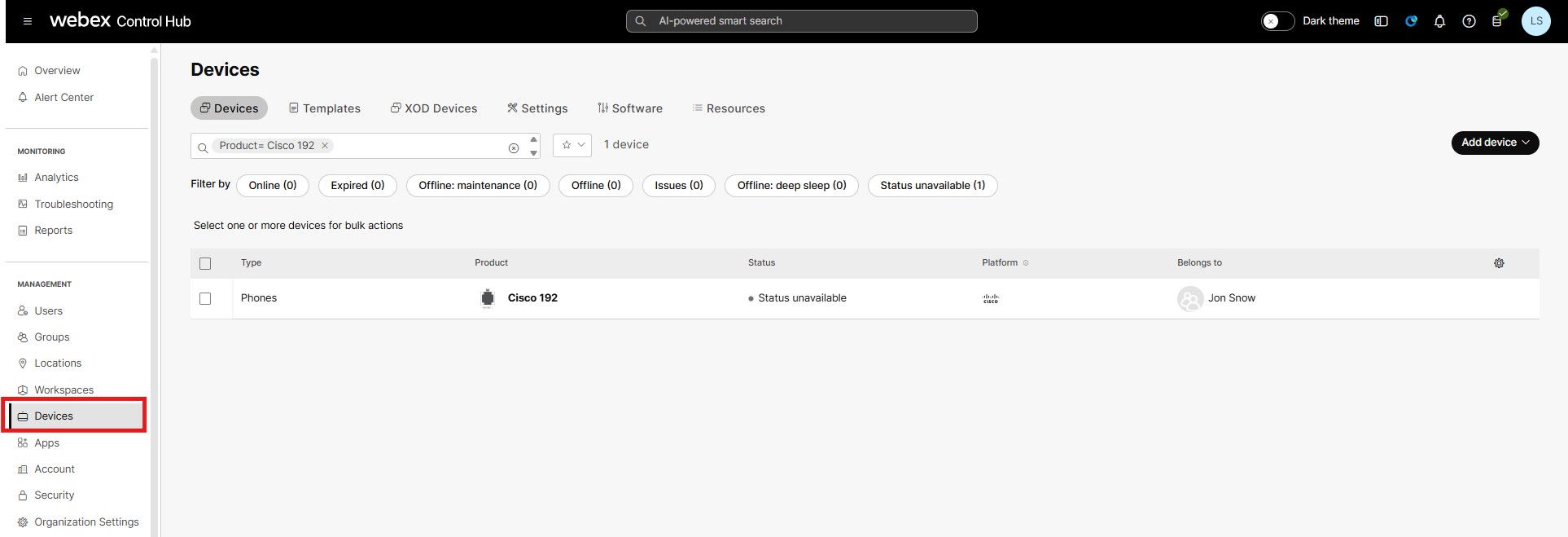 |
| 3 |
Clique em Todas as configurações. |
| 4 |
Configure os parâmetros desejados nas respectivas configurações do dispositivo. No campo Pesquisar por nome de configuração, selecione a configuração do dispositivo no menu suspenso ou insira o nome de uma configuração específica do dispositivo que você deseja configurar.
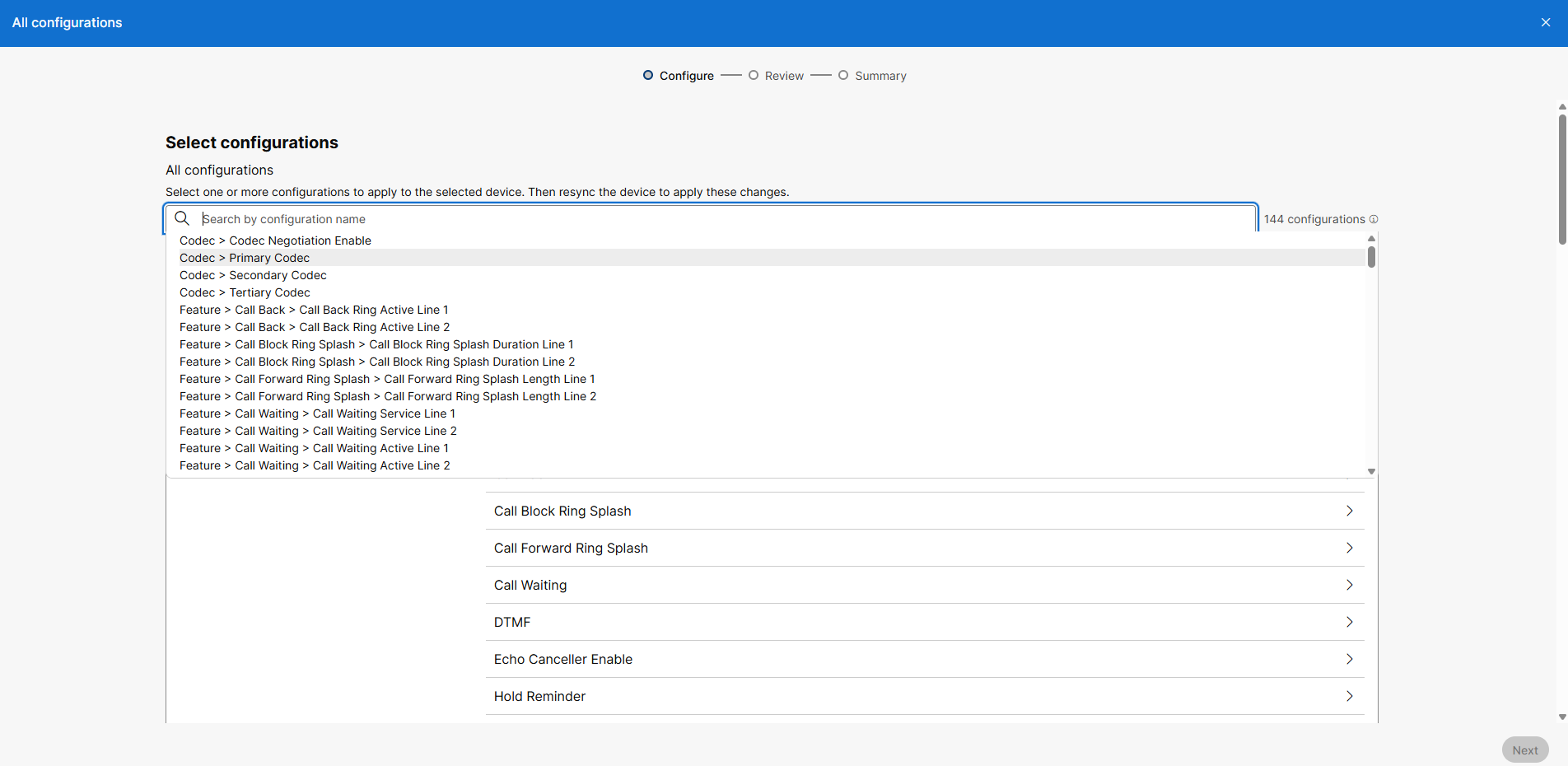 Use a dica de ferramenta ao lado da configuração para visualizar sua definição.
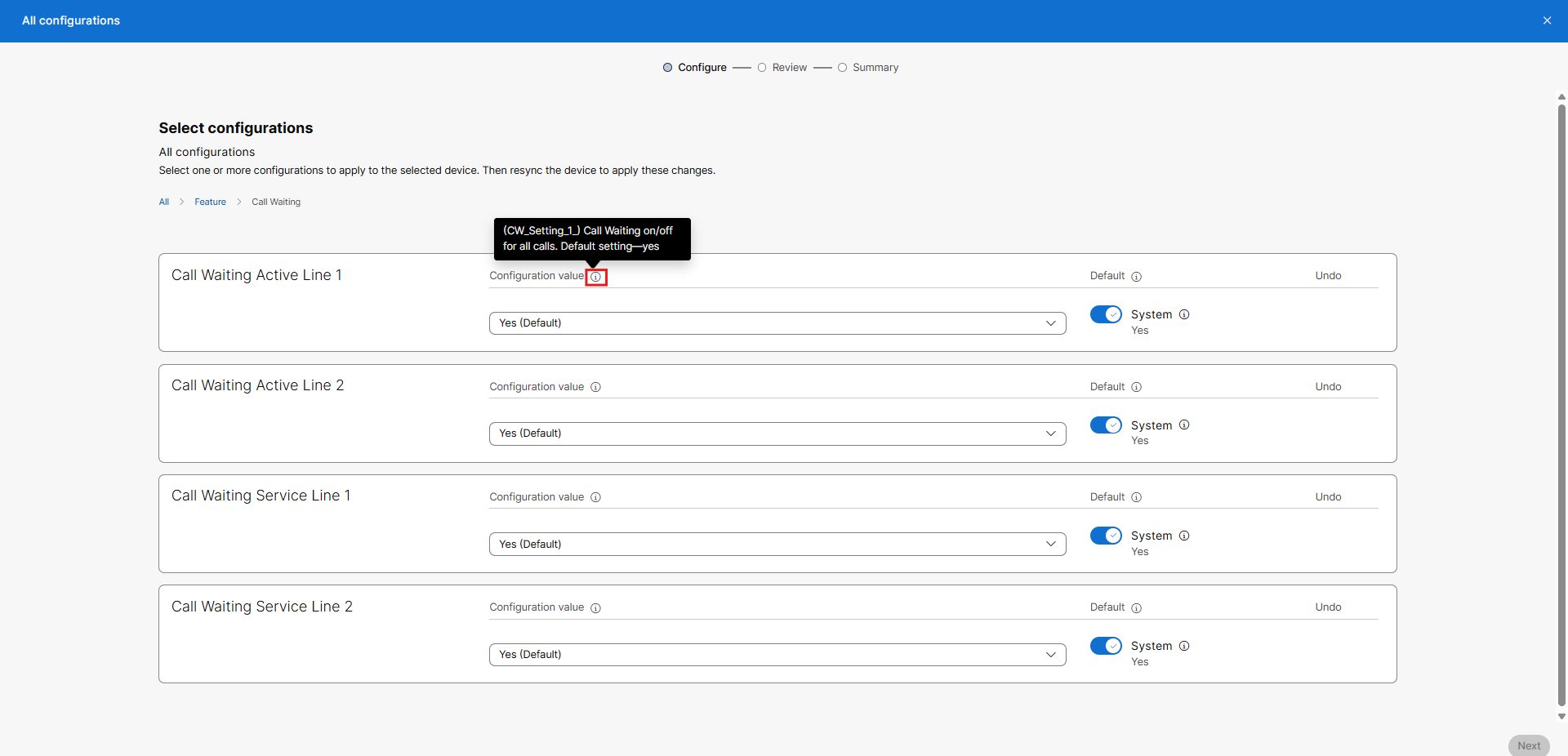 |
| 5 |
Clique em Próximo. |
| 6 |
Na tela Revisar, verifique as alterações de configuração e clique em Aplicar. Você também pode clicar nos ícones Editar ou Excluir, para realizar as ações necessárias.
|
| 7 |
Na página Resumo, veja as alterações aplicadas e clique em Concluído para fechar a página. |
|
802.1X |
Ative ou desative o Controle de Acesso à Rede baseado em Porta para dispositivos. Dispositivos mal configurados podem perder a conexão com a rede, exigindo que você reverta as alterações e faça uma restauração de fábrica local nos dispositivos para que voltem a ficar online. |
|
Feedback de voz para acessibilidade |
Define a disponibilidade do serviço de Comentários de voz no telefone. |
|
ACD |
Selecione a localização da tecla programável de login ou logout do agente da fila de chamadas em dispositivos MPP. Este parâmetro não é compatível com dispositivos MPP 8875. |
|
Destaque de chamadas ativas |
Controla o comportamento da tela padrão quando chamadas de entrada são recebidas. |
|
Prioridade de codec de áudio |
Escolha um dos três esquemas de prioridade de codec predefinidos disponíveis para a sua região. Recomendamos consultar um engenheiro de voz certificado pela Cisco antes de fazer alterações para evitar qualquer impacto na qualidade da voz. |
|
Imagem de fundo |
Escolha uma das opções de imagem ou selecione "Nenhum" para usar o plano de fundo padrão do telefone. Esta opção só funciona em telefones que têm um tamanho de tela de 800x480. O tamanho máximo do arquivo deve ser de 640 KB. |
|
Temporizador de luz de fundo |
Controla o uso da função de retroiluminação em dispositivos das séries 6800 e 7800. |
|
Menu Bluetooth |
Controla o uso da opção e do modo Bluetooth no telefone. |
|
Tecla de função expandida de encaminhamento de chamadas |
Define o comportamento padrão da Tecla de função de encaminhamento de chamadas entre a opção de menu múltiplo e as versões de opção única. |
|
Limite de chamadas por linha |
Controla o número de chamadas suportadas para cada linha telefônica exclusiva. |
|
Cisco Discovery Protocol (CDP) |
Permite ativar ou desativar o CDP para dispositivos locais. Dispositivos mal configurados podem perder a conexão com a rede, exigindo que você reverta as alterações e faça uma restauração de fábrica local nos dispositivos para que voltem a ficar online. |
|
Configurações de volume padrão |
Selecione o nível de volume desejado para os dispositivos MPP. |
|
Nível de registro padrão |
Selecione o nível de registro desejado para os dispositivos MPP. O nível de depuração pode afetar o desempenho do telefone e é aconselhável usá-lo apenas durante a resolução de problemas. |
|
Assistente de discagem |
Ativa ou desativa a função Assistente de Discagem no telefone. |
|
Nome de exibição |
Exibe o nome de usuário, o número de telefone do usuário ou o número de localização do usuário na tela do telefone. Se o usuário não tiver um número de telefone, o número de localização será exibido. |
|
Serviços DND |
Ative ou desative a função "Não perturbe" nos telefones MPP. |
|
Proxy HTTP |
Exibe o número da porta do proxy HTTP. O valor padrão é 80. |
|
Temporizador curto de Interdigit |
Define o tempo que o telefone aguarda que o usuário digite um dígito. Um valor de temporizador menor exige que os dígitos sejam inseridos rapidamente. |
|
Temporizador longo de Interdigit |
Define o tempo que o telefone aguarda quando nenhum padrão de dígitos corresponde antes de discar o número. Um valor menor do temporizador fará com que os dígitos discados não correspondentes sejam discados rapidamente. |
|
Etiqueta de teclas de linha |
Os rótulos das chaves de linha definem o formato do que é exibido ao lado das chaves de linha. Selecionar a extensão do usuário ou o primeiro nome exibe a extensão do usuário. Se o usuário não tiver um ramal, será exibido o primeiro nome do usuário. |
|
Padrão de LED de teclas de linha |
Padrões de LED definem esquemas de lightning para as teclas de linha no dispositivo MPP. O comportamento do LED da tecla de linha em seus telefones multiplataforma possui duas configurações opcionais:
A opção PERSONALIZADA não é compatível com o Webex Calling. Este parâmetro não é suportado nos dispositivos MPP 8875. Para obter mais detalhes, consulte o Guia de administração multiplataforma de telefones do Cisco IP Phone 8800 Series. |
|
Link Layer Discovery Protocol (LLDP) |
Ativar ou desativar o protocolo de descoberta da camada de enlace (Link Layer Discovery Protocol) para dispositivos locais. Dispositivos mal configurados podem perder a conexão com a rede, exigindo que você reverta as alterações e faça uma restauração de fábrica local nos dispositivos para que voltem a ficar online. |
|
Notificação de chamada perdida |
Controla a opção de exibir uma indicação visual de chamada perdida. |
|
Lista de monitores |
Controla se as linhas monitoradas do usuário devem aparecer para TODOS os dispositivos ou apenas para o dispositivo principal. O padrão é DESLIGADO, onde a lista de monitoramento do usuário é exibida apenas para o dispositivo principal. |
|
Acesso à web MPP (usuário) |
Ativar ou desativar o acesso em nível de usuário à interface web de telefones multiplataforma. Habilitar o acesso do usuário à web pode resultar em problemas de segurança. |
|
Multicast |
Configure o sistema de paginação multicast para permitir que os usuários enviem mensagens para seus telefones. A página pode ser acessada por todos os telefones ou por um grupo de telefones na mesma rede. Qualquer telefone do grupo pode iniciar uma sessão de paginação multicast. A mensagem é recebida apenas pelos telefones configurados para escutar o grupo de paginação. Selecione até 10 URLs de grupos multicast (cada uma com uma Porta de escuta exclusiva).
Especificar uma porta de uso comum pode afetar de forma negativa o dispositivo. Este parâmetro não é suportado nos dispositivos MPP 8875. |
|
Ressincronização noturna |
Controla o comportamento padrão do telefone em relação à sincronização de manutenção noturna com o Webex Calling. |
|
Cancelamento de ruído |
Controla o cancelamento ativo de ruído local durante chamadas ativas no dispositivo. |
|
Temporizador fora do gancho |
Especifique o tempo (em segundos) que um telefone pode permanecer fora do gancho. |
|
Porta de passagem |
Controla a utilização da porta Ethernet de passagem do computador em modelos de telefone compatíveis. |
|
Compartilhamento de firmware ponto a ponto |
O recurso de compartilhamento de firmware entre pares adiciona suporte para otimização de atualização de imagem para telefones IP. Quando ativado em um telefone IP raiz, o Compartilhamento de Firmware entre Pares designa o telefone para fazer uma solicitação de um arquivo de imagem. Isso estabelece uma hierarquia de transferência e transfere o arquivo de imagem do firmware do telefone IP raiz para os outros telefones IP na hierarquia. |
|
Idioma do telefone |
Selecione o idioma do seu telefone MPP. A definição disso substitui a configuração de idioma padrão no lugar do seu local provisionado. Selecione um dos idiomas disponíveis para o seu telefone MPP. |
|
Modo POE |
Ative ou desative o modo Power-Over-Ethernet para telefones multiplataforma. Dispositivos mal configurados podem perder a conexão com a rede, exigindo que você reverta as alterações e faça uma restauração de fábrica local nos dispositivos para que voltem a ficar online. |
|
Qualidade de Serviço (QOS) |
Permite ativar ou desativar a marcação de pacotes do dispositivo local para o Webex Calling. |
|
Porta USB traseira |
Ative ou desative o uso da porta USB traseira em dispositivos MPP. Desativar esse parâmetro pode fazer com que os dispositivos periféricos parem de funcionar. Este parâmetro não é suportado nos dispositivos MPP 8875. |
|
Protetor de tela |
Especifique o tempo de inatividade em segundos antes que o protetor de tela do telefone seja ativado. Este parâmetro é compatível com dispositivos MPP 8875. |
|
Exibir menu de senha do usuário |
Permite que o usuário final defina uma senha local no telefone e restrinja o acesso ao dispositivo. |
|
Layouts de teclas programáveis |
A configuração do layout das teclas programáveis permite que o administrador gerencie as teclas programáveis compatíveis com os telefones IP da Cisco. Para obter detalhes sobre a configuração de teclas programáveis para telefones Webex Calling que executam o firmware MPP, consulte Configuração de teclas programáveis. |
|
VLANs |
Especifique um ID de VLAN numérico para os dispositivos. Dispositivos mal configurados podem perder a conexão com a rede, exigindo que você reverta as alterações e faça uma restauração de fábrica local nos dispositivos para que voltem a ficar online. |
|
Rede wi-fi |
Especifique o SSID e a senha da rede Wi-Fi para telefones MPP com conexão sem fio.
Dispositivos mal configurados podem perder a conexão com a rede, exigindo que você reverta as alterações e faça uma restauração de fábrica local nos dispositivos para que voltem a ficar online. |
|
Webex Meetings |
Ativar ou desativar reuniões do Webex em telefones multiplataforma. |
|
Portas USB |
Ative ou desative o uso das portas USB em telefones multiplataforma. Desabilitar esse recurso pode fazer com que os dispositivos periféricos parem de funcionar.
|
|
URL de aplicação XML |
Insira o caminho XML para o servidor multicast. Este campo permite que telefones MPP recebam páginas de um servidor Informacast Fusion para exibir um elemento de interface do usuário ou uma imagem. O erro "URL inválida" é exibido quando os caminhos da URL estão incorretos. |
| Tipo | Configurações | Descrição |
|---|---|---|
| Codec |
Ativar negociação de codecs |
Habilita a negociação de codecs personalizados. Os valores são:
Selecione PERSONALIZADO para definir as tags primárias, secundárias e terciárias. |
|
Codec primário |
Selecione o codec principal. AVISO - Os codecs primário, secundário e terciário não podem ter os mesmos valores. Defina a opção "Ativar negociação de codec" como "PERSONALIZADO" para configurar as tags primária, secundária e terciária. |
|
|
Codec secundário |
Selecione o codec secundário. AVISO - Os codecs primário, secundário e terciário não podem ter os mesmos valores. Defina a opção "Ativar negociação de codec" como "PERSONALIZADO" para configurar as tags primária, secundária e terciária. |
|
|
Codec terciário |
Selecione o codec terciário. AVISO - Os codecs primário, secundário e terciário não podem ter os mesmos valores. Defina a opção "Ativar negociação de codec" como "PERSONALIZADO" para configurar as tags primária, secundária e terciária. |
|
| Recurso |
Ligar de volta > Retorno de chamada: toque na linha ativa |
Padrão de toque para notificação de retorno de chamada. Configuração padrão — 7 |
|
Bloqueio de Chamadas Toque Splash |
Duração do toque de chamada quando uma chamada é bloqueada (0 a 10,0 s) Configuração padrão — 0 |
|
|
Encaminhamento de chamadas Toque de espera |
Duração do toque de chamada quando uma chamada é encaminhada (0 – 10,0 s) Configuração padrão — 0 |
|
|
Chamada em espera |
Chamada em espera on/off para todas as chamadas. Configuração padrão — sim |
|
|
DTMF > Processo DTMF AVT |
Para usar o recurso AVT de processamento DTMF, selecione sim. Caso contrário, selecione não. Configuração padrão — sim |
|
| DTMF > Modo de transferência DTMF |
O modo de transmissão com detecção DTMF está disponível para informações SIP e AVT. As opções são: Rigoroso ou normal. Configuração padrão — Estrita, para a qual as seguintes condições são verdadeiras:
|
|
|
DTMF > Método de transferência DTMF |
Selecione o método para transmitir sinais DTMF para a outra extremidade: InBand, AVT, INFO ou Automático.
|
|
|
Cancelador de eco ativado |
Para ativar o cancelamento de eco, selecione "Sim". Caso contrário, selecione não. Configuração padrão — sim |
|
|
Lembrete de espera |
Toque para lembrete de chamada em espera quando o telefone estiver no gancho. Configuração padrão — 8 |
|
|
Sinal de mensagem em espera |
Definir esse valor como "sim" pode ativar o tom de gagueira e o sinal VMWI. Este parâmetro é armazenado na memória de longo prazo e permanecerá ativo após a reinicialização ou o desligamento e religamento do equipamento. Configuração padrão — não |
|
|
Reutilizar número CID como nome |
Use o número do identificador de chamadas como nome do chamador. Configurações padrão: sim |
|
|
Supressão de silêncio ativada |
Para ativar a supressão de silêncio e impedir a transmissão de quadros de áudio silenciosos, selecione "Sim". Caso contrário, selecione não. Configuração padrão — não. |
|
|
Limiar do Silêncio |
Selecione a configuração apropriada para o limite: alto, médio ou baixo. Configuração padrão — média |
|
|
Correio de voz > Chamada em andamento. Nenhuma nova linha de correio de voz. |
O parâmetro controla quando um toque de chamada é reproduzido quando o servidor VM envia uma mensagem SIP NOTIFY para o ATA indicando o status da caixa postal do assinante. Você pode configurar a linha 1 e a linha 2 do correio de voz. Estão disponíveis as seguintes três configurações:
Configuração padrão — Nova VM disponível |
|
|
Correio de voz > Intervalo de atualização do indicador de espera de correio de voz |
Intervalo entre atualizações do VMWI no dispositivo. Intervalo: 0–65535 segundos. Configuração padrão — 0 |
|
|
Correio de voz > Linha de política de toque para indicador de espera de correio de voz |
Duração do efeito de toque (ring splash) quando novas mensagens chegam antes da aplicação do sinal VMWI (0 – 10,0s). Configuração padrão — 0 |
|
|
Correio de voz > Indicador de espera de correio de voz Toque Splash Comprimento da linha |
Duração do efeito de toque (ring splash) quando novas mensagens chegam antes da aplicação do sinal VMWI (0 – 10,0s). Configuração padrão — 0 |
|
| Logoff |
Ativar depuração |
Ative o nível de depuração. |
|
Servidor Syslog |
O endereço IP (em notação decimal pontilhada) do computador que você está usando para executar o servidor Syslog. |
|
|
Módulos |
Valor que indica o sinalizador de depuração dos módulos:
|
|
| Rede |
Servidor de tempo |
Endereço IPv4 ou nome de domínio de um servidor NTP. Entradas válidas: endereço IPv4 ou nome de domínio Padrão—0.ciscosb.pool.ntp.org |
|
ATIVAR CDP |
Ativa ou desativa o Cisco Discovery Protocol (CDP). Os valores válidos para entrada são 0 e 1. 0 significa que o CDP está desativado. 1 significa que o CDP está ativado.
Uma configuração incorreta pode fazer com que os dispositivos locais percam a conexão com a rede. AVISO, a configuração incorreta desta opção pode fazer com que os dispositivos sejam desconectados da rede e exigir uma redefinição de fábrica local do dispositivo para colocá-lo novamente on-line. |
|
|
LLDP ATIVADO |
Ativa ou desativa o protocolo LLDP (Link Layer Discovery Protocol). Os valores válidos para entrada são 0 e 1. 0 significa que o LLDP está desativado. 1 significa que o LLDP está ativado.
Uma configuração incorreta pode fazer com que os dispositivos locais percam a conexão com a rede. AVISO, a configuração incorreta desta opção pode fazer com que os dispositivos sejam desconectados da rede e exigir uma redefinição de fábrica local do dispositivo para colocá-lo novamente on-line. |
|
|
Acesso a utilitários da Web HTTP(S) |
Controla o acesso à web no nível do usuário ao dispositivo local. |
|
|
Controle de fluxo |
Ativa ou desativa o controle de fluxo. Interface do usuário — Configuração da interface > Configurações avançadas > Página de Configurações da Porta, campo Controle de Fluxo. Os valores são: 0 — Desativado e 1 — Ativado Padrão—1 |
|
|
Duplex de velocidade |
A velocidade da porta e o modo duplex. Interface do usuário — Configuração da interface > Configurações avançadas > Página de Configurações de Porta, campo Velocidade Duplex. Os valores são: automático, 10h, 10f, 100h e 100f. Padrão — automático Exemplo — 100 Mbps, modo half-duplex 100h |
|
|
Ativar QoS |
Habilite ou desabilite a marcação QOS de pacotes do dispositivo local para a plataforma Webex Calling. |
|
|
Nervosismo > Linha de buffer de jitter |
Selecione "Sim" para ativar ou "Não" para desativar este recurso. Configuração padrão — sim |
|
|
Nervosismo > Linha de nível de oscilação |
Determina como o tamanho do buffer de jitter é ajustado pelo ATA. O tamanho do buffer de jitter é ajustado dinamicamente. O tamanho mínimo do buffer de jitter é de 30 milissegundos ou (10 milissegundos + tamanho do quadro RTP atual), o que for maior, para todas as configurações de nível de jitter. No entanto, o valor inicial do tamanho do buffer de jitter é maior para níveis de jitter mais altos. Essa configuração controla a taxa na qual o tamanho do buffer de jitter é ajustado para atingir o mínimo. Selecione a configuração apropriada: baixo, médio, alto, muito alto ou extremamente alto. Existem os níveis de jitter 1 e 2. Configuração padrão — alta |
|
|
Modem |
Ative um método alternativo para fazer a chamada do modem sem a pré-discagem do código de alternância da linha do modem. Configuração padrão: 0 |
|
|
RTP > Valor RTP CoS |
Valor CoS para dados RTP. Os valores válidos são de 0 a 7. Configuração padrão — 6. |
|
|
RTP > Valor RTP TOS DiffServ |
ToS/DiffServ Valor do campo em pacotes IP que transportam dados RTP. Configuração padrão: 0xb8 |
|
|
SIP > Consulte a linha de atraso de bye de destino |
Número de segundos a aguardar antes de enviar um BYE ao destino de referência para encerrar uma chamada inativa após uma transferência de chamada. |
|
|
SIP > Linha de atraso de folga do árbitro |
Número de segundos a aguardar antes de enviar um BYE ao árbitro para encerrar uma chamada inativa após uma transferência de chamada. |
|
|
SIP > Linha de atraso do bye do referenciador |
Número de segundos a aguardar antes de enviar um BYE ao remetente para encerrar uma chamada inativa após uma transferência de chamada. |
|
|
SIP > Valor SIP CoS |
Valor CoS para mensagens SIP. Os valores válidos são de 0 a 7. Configuração padrão — 3 |
|
|
SIP > Valor SIP TOS DiffServ |
TOS/DiffServ Valor do campo em pacotes IP que transportam uma mensagem SIP. Configuração padrão: 0x68 |
|
|
SNMP > Senha de autenticação |
Senha para autenticação SNMPv3. Interface do usuário — Administração > Gerenciamento > Página SNMP, campo Autenticação-Senha para SNMPv3. Entradas válidas — texto. Padrão—1111111111. Exemplo — MinhaSenha. |
|
|
SNMP > Protocolo de autenticação |
Protocolo de autenticação SNMPv3 Interface do usuário — Administração > Gerenciamento > Página SNMP, seção SNMPv3, campo Auth-Protocol As entradas válidas são: MD5 e SHA. Padrão — MD5. Exemplo — SHA habilitado para SHA. |
|
|
SNMP > Obtenha autenticação da comunidade |
Uma string de comunidade para autenticação em comandos SNMP GET. Interface do usuário — Administração > Gerenciamento > Página SNMP, seção SNMP, Get/Trap Campo comunitário. |
|
|
SNMP > Configurar autenticação da comunidade |
Uma string de comunidade para autenticação em comandos SNMP GET. Interface do usuário — Administração > Gerenciamento > Página SNMP, seção SNMP, campo Definir Comunidade. |
|
|
SNMP > Senha de privacidade |
Protocolo de autenticação de privacidade para SNMPv3. Interface do usuário — Administração > Gerenciamento > Página SNMP, seção SNMPV3, campo privprotocol. As entradas válidas são: Nenhum e DES. Padrão—DES. Exemplo — DES habilitado para DES. |
|
|
SNMP > Senha de privacidade |
Senha de autenticação de privacidade para SNMPv3. Interface do usuário — Administração > Gerenciamento > Página SNMP, seção SNMPv3, campo Senha de Privacidade Entradas válidas — string Padrão—1111111111 Exemplo MinhaSenhaPrivada |
|
|
SNMP > SNMP ativado |
Habilita ou desabilita o SNMP. Interface do usuário — Administração > Gerenciamento > Página SNMP, seção SNMP, opções Ativado e Desativado. As entradas válidas são: 0 — Desativado e 1 — Ativado. |
|
|
SNMP > IP confiável SNMP |
Endereço IP v4 confiável que pode acessar o ATA via SNMP. Interface do usuário — Administração > Gerenciamento > Página SNMP, seção SNMP, campo IP confiável. Entradas válidas — endereço IPv4 e máscara de sub-rede nesta ordem: 0.0.0.0/0.0.0.0. |
|
|
SNMP > Usuário SNMP |
Um nome de usuário para autenticação SNMP. Interface do usuário — Administração > Gerenciamento > Página SNMP, seção SNMPv3, R/W Campo do usuário. Entradas válidas — nome de usuário Padrão—v3rwuser Exemplo — MeuNomeDeUsuário |
|
|
SNMP > SNMPV3 |
Interface do usuário — Administração > Gerenciamento > Página SNMP, seção SNMPV3, campos Ativar e Desativar. As entradas válidas são: 0 — Desativado e 1 — Ativado |
|
|
SNMP > ARMADILHA > Endereço IP TRAP |
O endereço IP do gerenciador SNMP ou do agente de captura. Interface do usuário — Administração > Gerenciamento > Página SNMP, seção Configuração de Trap, campo Endereço IP. Entradas válidas — endereço IPv4 Padrão—192.168.15.100 Exemplo—209.165.202.129 |
|
|
SNMP > ARMADILHA > Porta TRAP |
A porta de captura SNMP usada pelo gerenciador SNMP ou pelo agente de captura para receber as mensagens de captura. Interface do usuário — Administração > Gerenciamento > Página SNMP, seção Configuração de Trap, campo Porta Entradas válidas — 162 ou 1025~65535 Padrão—162 |
|
|
SNMP > ARMADILHA > Versão SNMP do TRANP |
A versão SNMP em uso pelo gerenciador SNMP ou pelo agente de captura. Interface do usuário — Administração > Gerenciamento > Página SNMP, seção Configuração de Trap, campo Versão SNMP. Entradas válidas — Um dos números de versão SNMP listados abaixo:
Padrão—v1 |
|
|
VLAN > ID da VLAN WAN |
Um número que identifica a VLAN. Interface do usuário — Configuração de rede > Configurações avançadas > Página VLAN, campo ID da VLAN. Entradas válidas are—1~4094.
A configuração incorreta deste parâmetro pode fazer com que os dispositivos se desconectem da rede e exijam uma redefinição de fábrica local para que voltem a ficar online. |
|
|
VLAN > Ativar VLAN WAN |
Ativa ou desativa uma VLAN na sua rede. Interface do usuário — Configuração de rede > Configurações avançadas > Página VLAN, campo Ativar VLAN As entradas válidas são: 0 — Desativado e 1 — Ativado. |
|
| Configurações do telefone |
Atraso no gancho da chamada |
Este é o tempo em que o telefone permanece no gancho antes que o adaptador de telefone analógico encerre a chamada de entrada atual. O intervalo é de 0 segundos a 255 segundos. |
|
Atraso na reposição |
Atraso após a extremidade remota desligar antes da reprodução do tom de reordenação.
|
|
|
O prazo para retorno de chamada expira |
Tempo de expiração em segundos da ativação de um retorno de chamada. Intervalo: 0–65535 segundos. Configuração padrão — 1800 |
|
|
Intervalo de tentativas de retorno de chamada |
Intervalo de tentativas de retorno de chamada em segundos. Intervalo: 0–255 segundos. Configuração padrão — 30 |
|
|
Atraso no retorno da chamada |
Atraso após receber a primeira resposta SIP 18x antes de declarar que a extremidade remota está tocando. Se uma resposta de ocupado for recebida durante esse período, o ATA ainda considerará a chamada como falha e continuará tentando. Intervalo: 0–65 segundos Configuração padrão — 0,5 |
|
|
Temporizador curto de Interdigit |
Pequeno intervalo de tempo entre a digitação de dígitos durante a discagem. O temporizador Interdigit_Short_é usado após qualquer dígito, se pelo menos uma sequência correspondente estiver completa conforme discada, mas mais dígitos discados corresponderiam a outras sequências ainda incompletas. Intervalo: 0–64 segundos. Configuração padrão — 3 |
|
|
Impedância da porta FXS |
Define a impedância elétrica da porta PHONE. As opções são: 600, 900, 600+2.16uF, 900+2.16uF, 270+750 |
|
|
Temporizador longo de Interdigit |
Longo intervalo de tempo entre a digitação de dígitos durante a discagem. Os valores do temporizador entre dígitos são usados como padrões durante a discagem. O temporizador Interdigit_Long_é usado após qualquer dígito, se todas as sequências correspondentes válidas no plano de discagem estiverem incompletas conforme discadas. Intervalo: 0–64 segundos. |
|
|
Clonagem de endereço MAC ativada |
Ativa ou desativa a clonagem de endereços MAC. Interface do usuário — Configuração da interface > Configurações avançadas > Página de clonagem de endereço MAC, campo Clonar MAC Os valores são: 0 — Desativado e 1 — Ativado. Padrão—0 Exemplo — Clonagem de MAC ativada 1 |
|
|
Ressincronização noturna |
Permite que a ressincronização automática da configuração noturna do dispositivo MPP seja desabilitada.
Ao desativar a ressincronização noturna, quaisquer alterações de configuração no telefone não serão aplicadas, a menos que uma solicitação manual Aplicar alterações seja emitida do Control Hub ou se o telefone for reiniciado manualmente. |
|
|
Flash de gancho > Temporizador mínimo de flash do gancho |
O tempo mínimo em que o peixe está fisgado antes de ser solto é considerado um sinal de fisgada rápida. Menos do que isso, o evento onhook é ignorado. Intervalo: 0,1–0,4 segundos. Configuração padrão — 0,1 |
|
|
Flash de gancho > Temporizador de flash de gancho máximo |
O tempo máximo em que o peixe permanece no anzol antes de ser solto é considerado um sinal de fisgada rápida. Além disso, o evento onhook é tratado como onhook (sem evento hookflash). Intervalo: 0,4–1,6 segundos. Configuração padrão — 0,9 |
|
|
Polaridade > Linha de polaridade conectada Callee |
Polaridade após a conexão de uma chamada recebida: Para a frente ou para trás. Configuração padrão — Encaminhar |
|
|
Polaridade > Linha de polaridade conectada ao chamador |
Polaridade após a conexão de uma chamada de saída: Para a frente ou para trás. Configuração padrão — Avançar. |
|
|
Polaridade > Linha de polaridade ociosa |
Polaridade antes da conexão da chamada: Para a frente ou para trás. Configuração padrão — Encaminhar |
|
| Anel |
Tensão do anel |
Tensão de toque. As opções são 60–90 (V) |
|
Forma de onda em anel |
Forma de onda do sinal de toque. As opções são sinusoidal ou trapezoidal. Configuração padrão — Senoide |
|
| Segurança |
CA personalizado |
O endereço URL do local onde será armazenado o certificado personalizado de uma Autoridade Certificadora (CA). É possível especificar o endereço IP ou o FQDN do servidor. O nome do arquivo pode conter macros, como por exemplo: $MA, que se expande para o endereço MAC ATA. Configuração padrão — em branco. |
|
URL de CA personalizada |
O endereço URL do local onde será armazenado o certificado personalizado de uma Autoridade Certificadora (CA). É possível especificar o endereço IP ou o FQDN do servidor. O nome do arquivo pode conter macros, como por exemplo: $MA, que se expande para o endereço MAC ATA. |
|
|
Código da Lei da Conferência |
Caso esse código seja especificado, o usuário deverá digitá-lo antes de discar para o terceiro participante da chamada em conferência. Digite o código para participar de uma teleconferência. Configuração padrão — em branco. |
|
| Tom |
Tom de discagem para encaminhamento de chamadas |
Reproduz-se quando todas as chamadas são encaminhadas. Padrão setting—350@-5,440@-5;2(.2/.2/1+2);10(*/0/1+2) |
|
Tom de sustentação |
Informa a pessoa que ligou localmente que a outra extremidade colocou a chamada em espera. Padrão setting—600@-5;*(.1/.1/1,.1/.1/1,.1/9.5/1) |
|
|
Tom de indicação de chamada segura |
Reproduzível quando uma chamada é transferida com sucesso para o modo seguro. Deve ser reproduzido apenas por um curto período (menos de 30 segundos) e em um nível reduzido (menos de -19 dBm) para não interferir na conversa. Padrão setting—397@-5,507@-5;15(0/2/0,.2/.1/1,.1/2.1/2) |
|
|
Tom de invocação de recurso |
Reproduz-se quando uma funcionalidade é implementada. Padrão setting—350@-4;*(.1/.1/1) |
|
|
Toque de lembrete de chamada |
O sinal de espera é reproduzido nas portas do telefone durante a chamada ativa para lembrá-lo de que a chamada está em espera. Configuração padrão: Vazio |
|
|
Tom de Conferência |
Reproduzido para todos os participantes quando uma teleconferência a três está em andamento. Padrão setting—350@-5;20(.1/.1/1,.1/9.7/1) |
|
|
Tom de discagem |
Solicita ao usuário que insira um número de telefone. O tom de reordenação é reproduzido automaticamente quando o tom de discagem ou qualquer uma de suas alternativas expira. Padrão setting—350@-5,440@-5;10(*/0/1+2) |
|
|
Tom ocupado |
Reproduzido quando um código RSC 486 é recebido para uma chamada de saída. Padrão setting—480@-5,620@-5;10(.5/.5/1+2) |
|
|
Reordenar tom |
Reproduz-se quando uma chamada de saída falha ou depois que a outra parte desliga durante uma chamada estabelecida. O tom de reordenação é reproduzido automaticamente quando o tom de discagem ou qualquer uma de suas alternativas expira. Padrão setting—480@-5,620@-5;10(.25/.25/1+2) |
|
|
Tom de discagem MWI |
Reproduzido em vez do tom de discagem quando há mensagens não ouvidas na caixa postal do chamador. Padrão setting—350@-5,440@-5;2(.1/.1/1+2);10(*/0/1+2) |
|
|
Cadência > Cadência do anel |
Roteiro de cadência para anel distintivo. Existem cadências de anel do anel 1 ao anel 8. Padrão setting—60(0.25/9.75) |
|
|
Cadência > CWT |
Roteiro Cadence para CWT diferenciado. Existem cadências CWT de 1 a CWT 8. Padrão setting—30(.3/9.7) |
|
|
Anel traseiro |
Reproduzida durante uma chamada de saída quando o outro lado da linha está tocando. Configuração padrão: 440@-19,480@-19;*(2/4/1+2) |
|
|
SENTAR |
Alternativa ao tom de reordenação reproduzido quando ocorre um erro durante uma chamada de saída. O código RSC que aciona esse tom é configurável na tela SIP. Existem tons SIT 1 e SIT 2. Padrão setting—985@-4,1428@-4,1777@-4;20(.380/0/1,.380/0/2,.380/0/3,0/4/0) |
|
Qualidade de Serviço (QOS) |
Ative ou desative a marcação de qualidade de serviço (QoS) de pacotes do dispositivo local para o Webex Calling. |
|
Ativar ou desativar o CDP & LLDP |
Ative ou desative o Cisco Discovery Protocol e o Link Layer Discovery Protocol para dispositivos locais. Dispositivos mal configurados podem perder a conexão com a rede, exigindo que você reverta as alterações e faça uma restauração de fábrica local nos dispositivos para que voltem a ficar online. |
|
Ressincronização noturna |
Controla o comportamento padrão do telefone em relação à sincronização de manutenção noturna com o Webex Calling. |
|
Definir o temporizador de associação do convidado de local provisório |
Escolha a duração (em horas) do logon do Convidado de local provisório. |
|
Definir uma VLan |
Especifique uma ID de LAN virtual numérica para dispositivos. Dispositivos mal configurados podem perder a conexão com a rede, exigindo que você reverta as alterações e faça uma restauração de fábrica local nos dispositivos para que voltem a ficar online. |
|
Acesso à web |
Permite ou bloqueia o acesso às páginas de administração do telefone:
Quando definido como Não, a página web para administrador fica inacessível. Somente a página da web para o usuário está acessível. Para permitir o acesso à página web de administração após o acesso ter sido bloqueado, realize uma restauração de fábrica no telefone. |
|
Escolha em uma lista de prioridades de codec predefinidas — Em breve |
Escolha até três opções de prioridade de codec predefinidas disponíveis para sua região. Dispositivos mal configurados podem perder a conexão com a rede, exigindo que você reverta as alterações e faça uma restauração de fábrica local nos dispositivos para que voltem a ficar online. |
|
Prioridade de codec de áudio |
Escolha um dos três esquemas de prioridade de codec predefinidos disponíveis para a sua região. Recomendamos consultar um engenheiro de voz certificado pela Cisco antes de fazer alterações para evitar qualquer impacto na qualidade da voz. |
|
Senha de segurança do telefone |
Os administradores podem permitir que os usuários protejam seus telefones MPP com uma senha para maior segurança. Digite a senha ao ligar o telefone pela primeira vez ou após o telefone ser restaurado para as configurações de fábrica, para evitar alterações não autorizadas nas configurações do telefone. |
|
Protocolo de Acesso a Diretórios Leve (LDAP) |
Ative ou desative o Protocolo de Acesso a Diretórios Leve (LDAP). O telefone IP é compatível com LDAP, o que permite ao usuário pesquisar um diretório LDAP específico por nome, número de telefone ou ambos. Diretórios baseados em LDAP, como o Microsoft Active Directory 2003 e bancos de dados baseados em OpenLDAP, são suportados. |
|
Acesso à web |
Permite ou bloqueia o acesso às páginas de administração do telefone:
Quando definido como Não, a página web para administrador fica inacessível. Somente a página da web para o usuário está acessível. Para acessar novamente a página de administração após o acesso ter sido bloqueado, realize uma restauração de fábrica no telefone. |
Os dispositivos Poly e Yealink estão disponíveis como dispositivos gerenciados pelo Webex Calling. Para configurar as definições deste dispositivo de terceiros, consulte o seguinte:
-
Para configurar um dispositivo AudioCodes, consulte https://www.audiocodes.com/solutions-products/products/ip-phones
-
Para configurar um dispositivo Yealink, consulte https://support.yealink.com/en/portal/knowledge
-
Para configurar um dispositivo Poly, consulte https://docs.poly.com/

